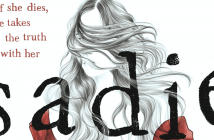My new novel, Waste of Space, is the story of a reality show wherein ten teenagers are stuffed into a rocket and hurled into space. Crazy, right?
A little too crazy. The show is, in fact, fake. This is not a spoiler; it’s revealed within the first few pages that the producers of the show team up with a space agency to plot and scheme over how they’ll accomplish the illusion of space. Their message to the world, however, is that it is real. They market it as real. They even tell the cast members that it’s real, making a lot of alluring promises and dangling in front of them opportunities to earn money, a better life, and – seemingly just as important in today’s world – fame.
At the helm is Chazz Young, the head of the network. He is obscenely rich, having inherited his father’s legacy. He is bombastic, narcissistic, provocative, and vengeful toward people who seem to be conspiring against him. At the same time, he’s a slick, silver-tongued charmer, willing to say or do whatever it takes to makes him look better than the other guy. He is also very tanned. What is up with that tan?
Once the show airs, the internet gobbles it up. #WasteOfSpace starts trending like crazy. Memes abound. Thinkpieces are written. The entire spectacle takes on a life of its own online, and before long it’s all anyone can talk or think about. America is riveted.
When the inevitable happens and the show starts to go off the rails, Chazz and the producers continue to insist that it’s real. Very loudly and emphatically. Screaming from the rooftops that their truth is the real truth, and that any other news put out there is, well, fake.
If any of this sounds familiar to you, rest assured it sounded familiar to me – but in the opposite direction. See, I wrote Waste of Space from the fall of 2015 to the spring of 2016. When I handed in my final draft to my editor in June, the Democratic and Republican national conventions were still over a month away. I was pretty sure I was writing a satire, with purposefully over-the-top, ridiculous characters, and events that couldn’t possibly take place in…real…life…uh…hmm. I see.
Here are a couple of lines that I wrote in early 2016:
“Someone as shallow and needy as him wouldn’t react kindly to learning that he’s lost a nationwide popularity contest.”
“This is only the beginning of my reign of terror. A year from now you’ll be sick of seeing me, but I won’t go away. I’ll feed off it, crave more, and the cycle of fame will continue. You’ll think, ‘Surely the fad should have ended by now,’ but oh no, it won’t end. It’ll never end. It’ll just keep going and going and going.”
As I wrote to my editor more than once during the election cycle: “Did…did I make all of this happen? Somehow? D o I h a v e p o w e r s?”
Sadly, I do not have powers. (If I did, I would have used them to prevent this whole mess in the first place. Also: pizza for every meal.) Media manipulation is nothing new; we’ve been stewing in it since its inception. We are bombarded every day with opinions on how we should think, feel, and act. Advertisers have us down to a science. Everything we consume has first been shaped by someone else, jammed through a Play-Doh Fun Factory into bright, interesting shapes explicitly designed to excite and delight us.
Reality television used to be the worst offender. What is truth? Well, it depends on what the editors choose to leave in or cut out. It depends on the story the producers want to manipulate you into believing and the feelings they want to evoke, regardless of what actually happens. Nothing new here, either – reality television has been around for twenty years now and there have been critics of it since the very beginning. But it certainly has morphed into a new dimension after the events of this year, where the blurring of entertainment and reality has taken on more significance than I think anyone was expecting. The 24-hour news cycle circus has become the new reality TV. What is truth? Well, it depends on which network you’re watching and which websites you’re reading.
On (of which I am a big fan – no really, you should watch it, it’s good, I promise) they have a saying: Perception is reality. Meaning that while there is fundamentally one true version of events, one set of cold hard facts, those facts are essentially meaningless. What really matters it what people think is true, because once they truly believe it, it becomes fact to them, and that’s what they use to inform their decisions going forward. In Waste of Space, no matter what events unfold onboard that spaceship, the editors can tell whatever story to the public that they want to shill instead, thereby overwriting the truth with their fiction. Perception becomes reality.
Waste of Space is not a political book – I wrote it because I wanted to parody a genre of television that I both dearly love and dearly love to hate on. But with everything that’s going on in this country right now, its parallels (however accidental they are) can’t be ignored. It would have made a nice cautionary tale. But now it’s real life. And just like those kids trapped in that spaceship, we’re only going to find our way out if we learn to think for ourselves, rather than blindly following those who yell the loudest.
But seriously – what is up with that tan?


